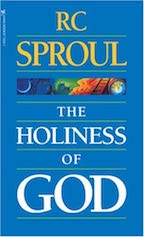The Holiness Of God by R.C. Sproul

An area in which R.C. Sproul was uniquely gifted can be seen in the first book he wrote (it should be considered a classic in Christian literature)—The Holiness of God. His ability to seamlessly integrate Theology, Philosophy, and Church History is on display throughout the book. In thinking about Creation, he begins to expose the utter folly of an Atheistic view of Creation-"There are modern theorists who believe that the world was created by nothing." If there is no God, then there is no Creator, then how did the world come into being? The Christian believes in the miraculous. As far as I understand, the Atheist rejects the existence of miracles. Sproul contends that "The modern view is far more miraculous than the Biblical view. It suggests that nothing created something. More than that, it holds out that nothing created everything-quite a feat indeed!" Sproul goes on to reason that the Atheist would not claim that the universe was created by nothing, but that it came into being by chance. Chance is a mathematical probability, it has no power or being, so in essence the Atheist is suggesting that all creation came from nothing.
One way to describe God is that "He Is." "He is pure being, the one who has the power, to be all by Himself." As a newly converted believer, R.C. was awakened from his sleep and went to the Chapel to worship the God of Creation. His sleep was disturbed by the words of Augustine, "that God created the world out of nothing by the sheer power of His voice." Moving on from Creation, Sproul began to wonder, if God is good and holy, why is the world chaotic? He became convinced that "The Holiness of God" is one of the most important ideas that a Christian can ever grapple with. That God's name, that his person should be revered, should be the ultimate priority of those who identify themselves with Him.
One of the terms the Bible uses for believers is saints. All believers were referred to as saints in the New Testament (not a select class of "Super Spiritual Christians"). Sproul notes that saints (which means "Holy Ones") ". . . were called saints not because they were already pure but because they were people who were set apart and called to purity." Israel was called out from among the nations to be separate for God, to be holy. Where do we first see the call "to be set apart for God?" Sproul writes, "The call to holiness was first given to Adam and Eve." Man was created in the image of his Maker. He was to mirror or reflect "His Creator"-"We were created to shine forth to this world, the Holiness of God." Through the rebellion of Adam, this was lost. Believers are "called out" to show forth God's holy image in this fallen world; as Israel was called out from among the nations to reveal the God of Israel to the ungodly nations of the world. All believers are saints, yet they still sin. How can this be? Martin Luther used the Latin term "Simul Justus Et Pecator;" to describe a Justified Sinner. A believer, a Christian, all who are "In Christ," a Saint, a Child of God is ". . . a person who is at one and the same time just yet sinful." That all believers are still sinners, is obvious, because we all, without exception, still sin. The saint is just because-"He has been justified . . . He is made just in the sight of God by the righteousness of Christ."
R.C. Sproul's "The Holiness of God" should not only be read but re-read and studied. It is, in my judgment, one of the four most significant Christian books written in the last fifty years. The other three books are: "Knowing God" by J.I. Packer,
The Pursuit Of Holiness" by Jerry Bridges, and "The Gospel According To Jesus" by John MacArthur Jr.
